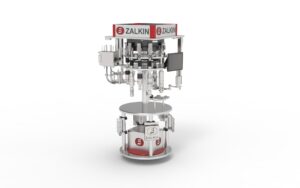Tethered caps has been an omnipresent topic in the packaging industry since the European Union adopted the Single Use Plastic (SUP) directive in 2019. This directive sets strict standards for beverages in single-use plastic bottles and by July 2024, beverages in plastic containers smaller than 3 liters will only be allowed to be sold in Europe if the cap remains attached “tethered” to the bottle. These industry changes call for multiple types of capping applications from machinery such as the articulating jaw from Fogg.

Impact of tethered caps
Several scenarios arise.
Scenario #1 – Brands currently running tethered caps on their bottling lines.
For these brands, the SUP directive will require little or no change in production. Such is the case of our long-standing customer, Cristaline, which was among the first brands to apply tethered caps onto their bottles of still and sparkling water.

Scenario #2 – Existing capping equipment whose transition to tethered cap is possible
For beverage bottling lines currently utilizing plastic screw-on caps and depending on cap design, bottle size and neck finish, a transition to tethered caps may be possible with an upgrade of current equipment or conversion of cap and/or bottle handling equipment. Over the past 3 years, Zalkin has been working with customers and cap suppliers with:
- evaluating current capabilities
- laboratory testing to validate cap design
- studying the productivity and economic impact of equipment modification
As closure design can vary according to the individual application and beverage container specifications, collaborating with each brands innovation and production teams is vital in implementing the right solution to best meet their requirements.
Scenario #3 – Current capping equipment unable to manage a future tethered cap
Due to the specific configuration or limitations of current capper and associated capping equipment, a retrofit may not be a viable solution for tethered cap application.
This option could also be cost prohibitive and worse yet, impact negatively on production.
New capping equipment may need to be added to address all requirements not only for proper tethered cap application but also to properly handle new bottle sizes or shape changes. A new capper could also offer the added advantage of flexibility of applying a greater number of cap types (combination of screw-cap, snap-on cap, sport cap,…) and bottle sizes.
Zalkin is working with its customers to evaluate and develop options for their bottling lines and offer solutions for transitioning to the application of tethered caps.
Considerations for transitioning to tethered cap
- Caps
- Tethered caps need to offer customers the same physical performance as standard closures
- Neck finishes
- Closures ideally need to be implementable without the need for modifications to bottle neck finishes and without loss of efficiency in the handling processes
- Capping process
- Various solutions have been developed that can be adapted to all important bottle neck sizes
- with minimal conversion effort
- without negatively affecting the application processes
- Various solutions have been developed that can be adapted to all important bottle neck sizes
Solutions offered by Zalkin to help with this transition by 2024
Zalkin, as a world leader in capping equipment, has extensive experience with tethered closures, in particular for the bottled water industry. Zalkin has worked in collaboration with cap manufacturers and bottled water brands to implement tethered cap solutions on over 100 cappers, either converted or new.
Zalkin is prepared to assist brand owners and OEMs with a full range of solutions adapted to the complexity of tethered caps and this significant packaging change. Zalkin is prepared to:
- assist in the development and testing of cap designs on a pilot machine,
- offer the best solution for the evolution of customer’s capping machine
- improve the capper performance over the entire capping management process from cap handling to quality control.
For this implementation, Zalkin has a multidisciplinary conversions & upgrades team capable of managing the most complex cap changes. This includes experts in the application of screw-on caps, research and development engineers, technicians, and experienced sales teams. Do not hesitate to contact them through maxime.capel@zalkin.fr
To know more about the Single Use Plastics (SUP) Directive

